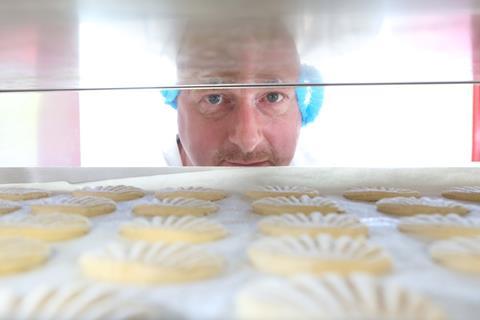
A sweetening blend for biscuits that promises to reduce sugar by at least 20% has been developed through an innovative Welsh research project.
The study was initiated by Llanrwst-based Shepherd’s Biscuits which supplies independent stores, foodservice providers, and hotels across the UK. It focused on whether the sugar content in biscuit recipes could be reduced without affecting flavour, texture, or appearance.
The result was a blend comprising five ingredients – sugar, soluble fibre, maltodextrin, fructose, and a natural sweetener.
Part-funding for the project was received from the Welsh Government’s Covid Recovery Fund and was in line with its overarching strategy campaign entitled ‘Healthy Weight: Healthy Wales’, which looks to incrementally improve the health and wellbeing of the nation.

For the research, Shepherd’s Biscuits founder James Shepherd collaborated with experts at the Food Technology Centre – part of Grŵp Llandrillo Menai’s Llangefni college campus in Anglesey – to see if previous UK Government targets for reducing sugar and carbohydrates were achievable without compromising biscuits’ appealing characteristics.
“The project looked to explore and develop new methods for producing lower-sugar, lower-carbohydrate biscuits which taste every bit as good as their traditional high-sugar, high-carbohydrate equivalents,” Shepherd added.
Julia Skinner from the Food Technology Centre said her research included looking into a previous government challenge to the industry to achieve a 20% sugar reduction in a range of products that contribute the most to children’s sugar intake. “I then reviewed healthier biscuits on the market to better understand the ingredients typically used to achieve such benefits,” she added.
This work led to an investigation of all ingredients with the potential to partially or totally substitute wheat flour and lower the carbohydrate content, or to replace sugar. Some of the larger ingredient suppliers were found to offer their own solutions to these issues through targeted specialist ingredients.
Skinner undertook kitchen trials, scanning a range of the most promising ingredients in a biscuit recipe, and used nutritional software to quantify each improvement achieved. A sensory taste panel was also brought in to provide feedback on the most promising recipes.
“It was surprising how much sugar could be removed just by adjusting the proportions of ingredients within the recipe, which was the simplest approach,” commented Skinner. “A range of soluble fibre ingredients and maltodextrin worked very well as partial sugar substitutes, whilst still providing the bulk properties of the replaced sugar.
“Where the sweetness then required a boost, this could be provided by natural flavour enhancers. Alternatively, polyol ingredients such as maltitol work well as total sugar replacers, although their consumption does come with limits.”
Skinner said they were currently pushing to get the wider Welsh bakery industry on board with reducing sugar in their products, so that a “real impact on daily diets” could be achieved.
Beyond biscuits
Shepherd Biscuits director James Wasdell also noted that the aim of the project had been to not only create a high quality, lower-sugar – and initially a lower-carbohydrate – biscuit, but also to share the ingredients and knowledge with all bakers in Wales.
Wasdell highlighted that the project’s findings had the potential to be applied to other baked goods including cakes. “We’ve calculated that swapping sugar for the new sweetening blend adds about 5% to the cost of production,” he admitted. “So, we need a commercial ingredient manufacturer to take this on and create blends that bakeries can buy in and reduce the sugar content in their goods too.”
Elsewhere in the industry, the producer of sugar reduction ingredient Incredo Sugar has received £24.2m to develop new products for the UK market, and a new fund was launched last month in Scotland to assist bakers in making healthier products.
































No comments yet